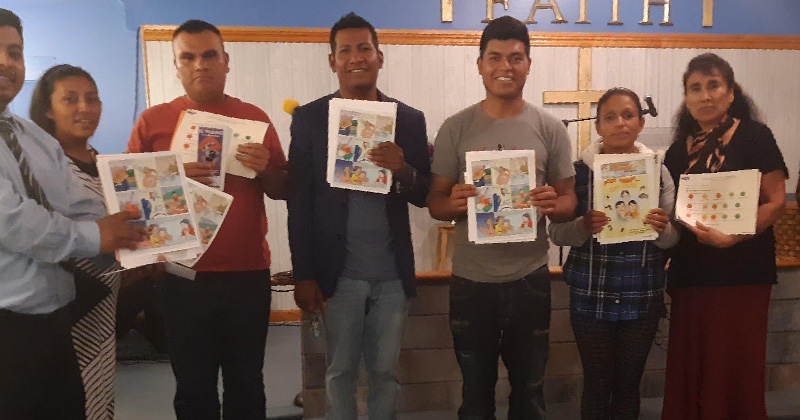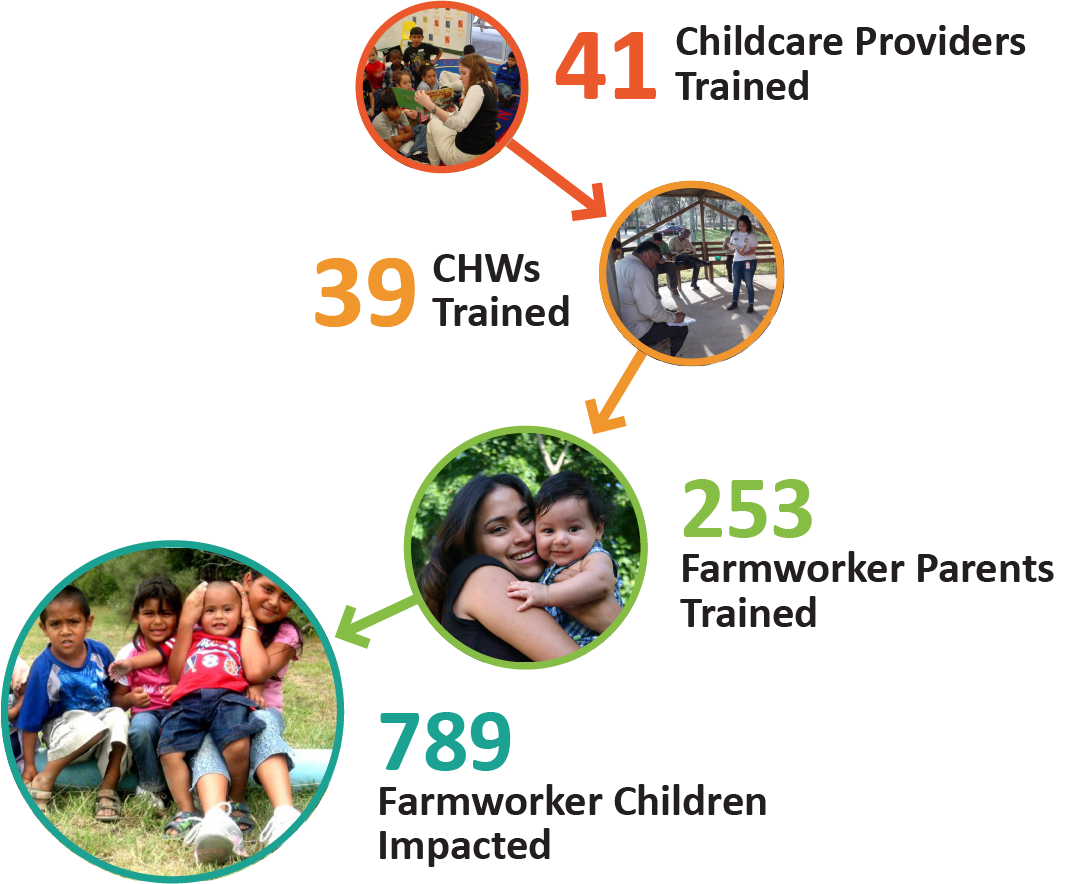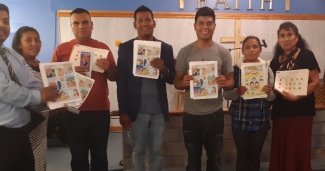Knowledge is Power: Reaching Farmworkers on the Eastern Shore of Virginia with Environmental Health Education

Farmworker parents after participating in an environmental health and safety talk with a community health worker.
By Kate Kruse, Project Coordinator, Migrant Clinicians Network
Prior to living and working in the United States, East Coast Migrant Head Start Project (ECMHSP) staff member José Enriquez was unaware of the multitude of environmental hazards one can encounter in agricultural settings, but he was familiar with the concept of community health workers (CHWs), or promotores de salud, as they are known in his country of origin. Growing up in Mexico, Enriquez lived in a small rural town that was frequently visited by promotores, who shared information and resources about hygiene, sanitation, and hydration. Living in an area where it was difficult to access doctors, promotores de salud often provided basic preventative and curative health care, helping to foster a community of healthier, more informed families.
After moving to the United States, Enriquez found a home in Parksley, Virginia, where he helps provide childcare services for migrant families at ECMHSP. When Enriquez was first approached to assist with MCN’s project to train farmworker parents to be CHWs, he was delighted and honored to join our team, knowing personally the positive impact it could have on farmworkers on the Eastern Shore of Virginia, a similarly rural and isolated population that often struggles to receive health care and information. Through this two-year project funded by the Aetna Foundation’s Cultivating Healthy Communities Grant Program, MCN and ECMHSP staff trained farmworkers to be CHWs by sharing information and resources about environmental health and community outreach strategies. Aside from information about agricultural hazards, this training also provided CHWs with a selection of MCN’s Environmental and Occupational Health Comic Books and a plethora of adult education techniques, which largely focus on participatory methods that allow participants to learn through hands-on activities. With the support of our partners at ECMHSP, these trained CHWs then went out into the community to help other farmworker parents and childcare providers learn how to minimize children's exposure to environmental hazards like pesticides, lead, and asthma triggers. Throughout the project, we maintained consistent communication between our project team and the CHWs, which gave us great feedback on our program, allowing us to modify and strengthen our resources and outreach strategies to better fit the needs of the farmworker community.

Over the two years of this project, MCN trained a total of 41 childcare providers and staff working with underserved immigrant families and 39 farmworker parents to serve as community health workers. These CHWs reached 253 families with education to help parents protect an estimated 789 children from environmental hazards. In addition to the notable quantity of individuals that were reached, the results of our evaluations show that the participating farmworker parents gained a lot of crucial health and safety information from meeting with the CHWs. Following our intervention in which CHWs trained parents, the average change of knowledge among farmworker parents was 222 percent, demonstrating that our project successfully helped farmworkers in this community learn about the dangers of pesticides and other environmental hazards, including their effect on children.
Beyond solely informing the trained CHWs and farmworker parents, this project had a positive impact on the health and practices of everyone involved, including our partners at ECMHSP. Carina Ramirez, a parent and childcare worker at ECMHSP, also played a key role in this project by facilitating communication between MCN and the trained CHWs and accompanying and supporting the CHWs while they shared information with farmworker parents. As a childcare provider, Ramirez had some prior knowledge about keeping children safe from hazards and exposures, but her knowledge and safety practices were strengthened over the course of this project. After working with us for two years, she shared her gratitude for this program and the impact it has had on her daily life: “As a parent, I personally learned a lot. I would clean with chemicals and tell my daughter, ‘go ahead and go outside and play.’ I didn’t know all of this dangerous stuff was out there.” Because of this project, childcare providers, CHWs, and farmworker parents alike are now equipped with the knowledge and resources necessary to cultivate a safe, healthy community that will protect their children from being exposed to hazards in and around their homes.
After two years of this program, Enriquez, Ramirez, and the rest of the ECMHSP staff could already see the positive effects of our efforts. “People are telling their parents, people are telling their friends,” Ramirez shared. “The community is starting to know about this [information].” Reflecting back on our work, Enriquez expressed: “This is something really great to see work firsthand. It was very successful and actually reached the people who don’t have the resources to go out and get the information themselves.” Through our trained CHWs, we successfully helped this community build the knowledge and resources necessary to keep themselves and their children safe from agricultural hazards and exposures. These CHWs may have only shared their knowledge with a portion of the farmworkers in their community, but this information will continue to be spread among neighbors, friends, and coworkers, planting a seed that ultimately will foster a network of healthier, more informed families.
Here are some resources that can help:
Webinar: It's Your Right to Know! Helping Community Health Workers Promote Chemical Safety on the Job
Training manual: A Little Bit of Poison...Will It Kill You?/Poco Veneno….No Mata? A Pesticide Education Manual for Community Health Workers
Comic book: Pesticides Nearby… But Staying Healthy / Aunque cerca … Sano. A Guide to Prevent Pesticide Exposure
Journal article: A Pilot Program Using Promotoras de Salud to Educate Farmworker Families About the Risks from Pesticide Exposure
Like what you see? Amplify our collective voice with a contribution.
Got some good news to share? Contact us on our social media pages above.
Return to the main blog page or sign up for blog updates here.
- Log in to post comments
